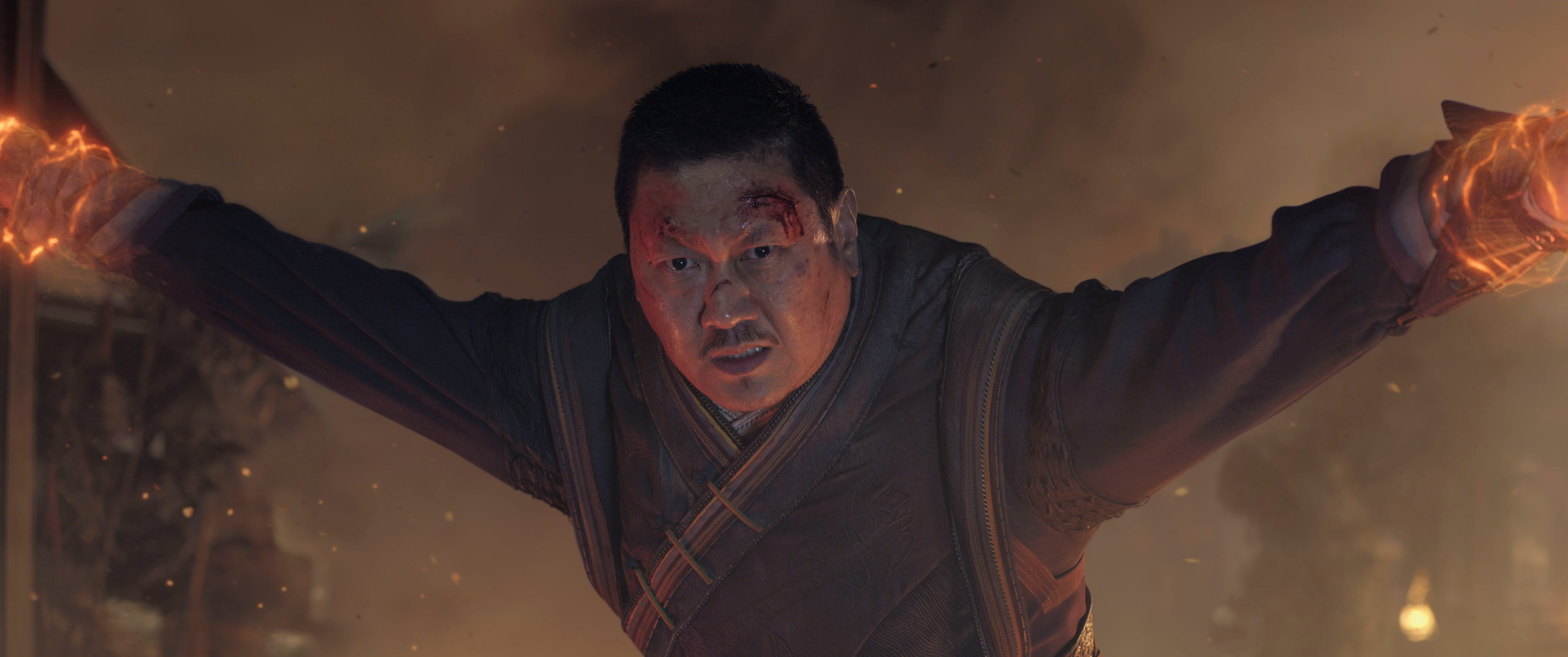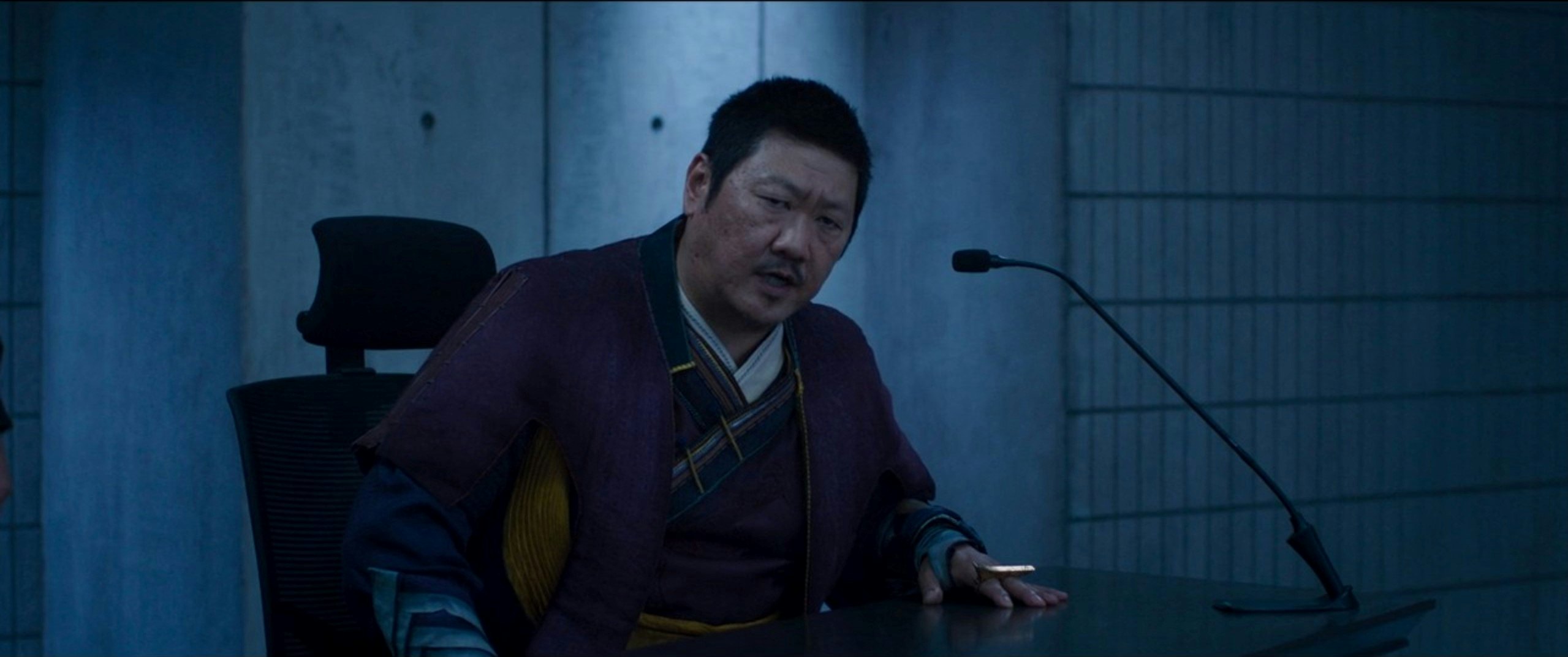
There was a time when Wong wasn’t even going to be included in the Marvel Cinematic Universe.
During the making of the 2016 film Doctor Strange, director Scott Derrickson initially opted not to include Wong on the basis that the character, as seen in the comics, erred too close to antiquated Asian stereotypes.
In his original incarnation, he was a servant to a white protagonist, dressed in silk clothing, and was more or less a sexless figure. It was only after Tilda Swinton was cast as the Ancient One that Derrickson chose to include an Asian character played by an Asian actor. But that character needed to change, starting with their look. And so, Wong was transformed from a hard-to-swallow caricature into a robust character who displayed humor and a dash of pathos.
Enter Benedict Wong, a British actor born to Hong Kong immigrants. With a stockier frame, a smoker’s voice, and a commanding presence somewhere between a gym teacher and a drill sergeant, Wong helped embody a new Wong, whose deadpan humor and cold demeanor meant fans could both take him seriously and depend on him for a good laugh.
In his first appearance in Doctor Strange, Wong lacked personality. That was by design. In an effort to make Wong cool and collected, Derrickson and screenwriter C. Robert Cargill imagined Wong as the dedicated librarian of mystic texts in Kamar-Taj. In his second encounter with Doctor Strange (Benedict Cumberbatch), he’s called “Beyoncé,” a follow-up to one of Strange’s lame jokes. But Wong is later seen listening to Destiny’s Child, showing that maybe he wasn’t a total stick in the mud.
Post-Avengers: Endgame, Wong has authority as the Sorcerer Supreme, the highest of all Masters of the Mystic Arts. It’s an important job, but that responsibility doesn’t keep him from a good Sopranos binge or karaoke with Shang-Chi, which not only makes Marvel’s characters feel a touch more relatable and human, but the universe they inhabit easier to immerse ourselves in.
She-Hulk: Attorney At Law, however, may be pushing the MCU’s limits with Wong. In the latest episode, which marks the second consecutive appearance of Wong in the Disney+ series, Wong is dragged back into the offices of Jennifer Walters (Tatiana Maslany) to deal with a Los Angeles magician, Donny Blaze (Rhys Coiro), who’s recklessly using Mystic Arts for his show.
Wong and She-Hulk

Not only is Donny Blaze violating copyright (sort of), but Donny doesn’t have the skill to prevent a catastrophe should something go wrong. Inevitably, it does. Meanwhile, in an entertaining C-plot, Wong strikes up a friendship with a party girl named Madisynn (Patty Guggenheim), who walks away unscathed from the depths of hell itself.
Between the episode’s post-credits scene — another fun yet empty add-on where Wong and Madisynn discuss weird cocktails — and the revelation that Wong worked at a Target in Nepal before joining the Mystic Sorcerers, there’s a risk Wong is being stretched too far, removing him from the fresh hero he was supposed to be.
Is Wong really so flexible that he, like Madisynn, can walk away from all his problems unscathed? Or is Marvel tempting fate by watering down one of its best and most progressive characters, one it tried so hard not render a laughingstock in the first place?
Wong’s future in the MCU

Juxtaposing grounded humor with fantastical elements has been Marvel’s modus operandi for years. After decades of Hollywood action movies playing things mostly straightforward, the MCU stumbled upon an appealing tone of verisimilitude through 2008’s Iron Man, which director Jon Favreau imbued by borrowing from Richard Donner's Superman: The Movie.
Donner had an uphill creative battle in making a superhero movie that jaded, Watergate-era audiences could embrace. Rather than fully display the silliness of Superman’s comics, or contort him into something he wasn’t meant to be, Donner found a middle ground. Years later, Favreau did the same. Both movies — and the MCU movies that followed — were less concerned about being feverishly dedicated to the comics and more about adapting everything that makes these stories fit the needs of a new medium, and a new audience.
Which brings us back to Wong. In its first decade, the MCU perfectly epitomized verisimilitude. No matter how wacky things got, there was still an air of some authenticity. Look no further than 2011’s Captain America: The First Avenger, which successfully took one of Marvel’s more difficult subjects and found a fresh, believable angle.

Doctor Strange in the Multiverse of Madness didn’t give Wong much of a story, but it still gave him time to communicate a range of human emotions. Throughout Multiverse of Madness, Wong feels everything from dogged determination, to discipline, to fear, sadness, and even satisfaction.
She-Hulk: Attorney At Law is a sitcom, not a blockbuster. Its goal is to make Marvel fans laugh. But this is still the MCU, and this is still Wong. While it’s a testament that Wong can appear in She-Hulk and not feel so removed from Multiverse of Madness, it’s unclear if Wong can endure these tonal shifts any longer without losing the goodwill his character accumulated as a serious authority figure. The stakes are especially high considering that Asian men rarely get the chance to shine in pop culture. With so much at stake, even Marvel’s throwaway gags feel glaring when taken in isolation.
It’s probably not going to matter that Wong worked at Target before becoming the Sorcerer Supreme. But as Marvel relies too much on laughing at itself these days, can Wong put up with it all? Or is he destined to hole up in Kamar-Taj and finish The Sopranos rather than bother with the next Marvel crossover?
She-Hulk: Attorney At Law streams new episodes Thursdays on Disney+.






